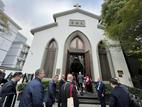As the saying goes, "An elderly person in the family is like a treasure." A long-lived and respected elder is often seen as a blessing. They not only serve as the backbone of the entire family but also of the extended clan, playing a key role in guiding the family’s development. Such individuals deserve kindness and respect from their family members. In our Christian faith, respecting and caring for the elderly is also a commandment from God to His people.
Today, as China experiences a growing aging population, the number of elderly believers in both urban and rural churches is also increasing. Elderly pastoral care has become an unavoidable and pressing issue for the church. In this body of Christ, how can we view elderly brothers and sisters as "treasures" within the church family? And how can we shepherd and guide them to live out the precious life of Christ?
Last week, in celebration of the annual Double Ninth Festival (Chongyang Festival), the Gospel Times editorial team gathered to reflect on their experiences visiting churches across various regions in recent years. They discussed effective practices that churches have implemented to care for and lead their elderly believers, helping them bear fruit even in old age and “stay fresh and green.”
Below is a summary of the roundtable discussion.
Elderly Believers in the Church
In Fujian, a well-developed coastal region, the generally higher levels of education and broader worldview among the population have influenced the church. Many elderly volunteers and believers in the coastal cities of Fujian, though not core church leaders, have developed a deep understanding of faith and church management, often comparable to that of pastors. These elderly believers share a common trait: a fervent desire for spiritual growth, coupled with high standards for the quality of their spiritual lives.
In northeastern China, elderly believers are especially enthusiastic about attending church gatherings. Regardless of the size of the gathering, they eagerly participate. There are many touching testimonies, such as elderly believers in their 90s or even over 100 still attending services regularly. They are extremely dedicated to serving the church, whether it be in prayer watch or Martha’s Ministry (or cooking ministry), always willing to contribute. However, a common challenge they face is a shallow understanding of biblical truths, likely due to age or educational background. It is not uncommon for some to struggle with staying awake during sermons.
Many elderly believers remain steadfast in their faith and exhibit genuine passion in their spiritual lives. For example, they are often the backbone of continuous prayer activities, particularly during early morning prayer times when younger members find it difficult to keep up. Despite this, some of their faith practices may reflect elements of local customs or folk beliefs.
One notable strength of elderly believers is their strong sense of responsibility and active commitment to evangelism. When pastors speak about them, they often highlight their dedication to the mission of spreading the gospel. Many of these elderly believers view evangelism as their God-given mission and life purpose, tirelessly sharing the gospel with family, neighbors, and their communities.
Furthermore, elderly Christians are particularly sensitive to relationships, valuing connections with both their peers and the younger generation. Their love and care are evident in daily interactions, often displaying a warmth that younger believers may not naturally express. For example, a reporter once met an elderly woman at church and shared some life challenges with her. A year later, when they met again, the elderly woman remembered and inquired about whether those challenges had been resolved.
Exploring the Practices of Elderly Ministry in Churches Across Various Regions
In recent years, churches in various regions have developed notable practices in elderly pastoral care.
In Fujian, a church in a regional city keeps track of the birthdays of every registered elderly believer in the fellowship. The first Sunday afternoon of the last month of each quarter is set aside for a collective birthday celebration. Church pastoral staff and fellowship leaders attend, offering birthday blessings and words of encouragement. The elderly are joyous because they are remembered by the church family. This tradition, which has continued for over ten years, allows every elderly member the opportunity to celebrate their birthday within the church. These celebrations typically have at least 200 participants.
Furthermore, this elderly fellowship organizes a Golden Autumn wedding anniversary celebration every five years for those who have reached significant marriage milestones, such as golden, emerald, or diamond anniversaries. This is an opportunity for the elderly to share their testimonies and leave with commemorative photos. This initiative has been well received among the elderly, deepening their connection and commitment to the church. A county church in Jiangsu has implemented a similar ministry, celebrating milestone birthdays for its elderly members.
In a suburban church in Shanxi, most of the elderly believers have migrated from rural areas, and the relationships among the congregation are close-knit. Many attend daily morning services together. The church's worship services carry a strong sense of connection to everyday life. After regular worship, time is set aside for testimony sharing, where people openly share family needs or difficulties, and the church prays collectively. This practice has effectively helped elderly believers experience and express God’s love in their lives.
Unlike the focus in Fujian and Shanxi, a church in one of Jiangxi’s regional cities emphasizes visitation ministry as the key element of elderly pastoral care.
They dedicate a great deal of effort to this ministry, setting aside every Tuesday afternoon specifically for visiting elderly believers. These visits provide not only prayer and companionship but also share recent church updates with elderly members whose mobility is limited, asking them to pray for the church. Through this, elderly members feel cared for and tangibly involved in the church’s mission.
Grassroots churches in Liaoning and Heilongjiang focus on helping elderly believers find self-worth and accomplishment in their lives through ministry. A church in Heilongjiang encourages every believer, including the elderly, to serve. The church helps them find roles in ministries—those with limited physical ability participate in prayer watches, while those with more strength serve in the kitchen or help heat the furnace. Previously, many elderly believers stayed at home for extended periods with little to do, leading to overwhelming feelings of emptiness and a sense of worthlessness in their old age. After the church encouraged all members to work and serve, the vitality of elderly believers has greatly improved. Local pastors report that many elderly believers have gained a deeper understanding of biblical teachings through service. They take their assigned roles seriously, finding self-worth and living hopeful lives.
A church in a coastal city in Fujian has adopted an approach in which every elderly believer serves as both a recipient and a participant in the visitation ministry. A pastor mentioned that on visitation days, members eagerly sign up in the group chat to participate. Those who sign up late must wait for the next round of visitations.
To enhance the elderly's understanding of Scripture, literacy class ministries in grassroots churches serve as practical initiatives. In some grassroots churches in Jiangsu, literacy classes for seniors are very active. Copying Bible verses has also been effective in improving literacy skills. Over the years, many elderly believers have significantly deepened their understanding of the Bible, and the church’s spiritual atmosphere has gradually been refreshed.
Additionally, audio players have played a significant role in the pastoral care of grassroots churches, especially in rural and remote areas. More than a decade ago, a pastor from a rural church personally funded the production of audio players as gifts for elderly believers. These devices have been a great help to elderly believers who can only operate simple electronic devices. Some elderly believers in remote areas still rely on these players to receive the Word to this day.
Where is the Way Forward in Elderly Pastoral Care?
A potential breakthrough in elderly pastoral care lies in addressing their needs for care and a sense of self-worth. The elderly, on the one hand, highly value a sense of belonging and love, and on the other, they greatly desire a sense of accomplishment. The church must invest in building relationships and help them find their purpose in life through mission and vision. Achieving this requires more than simple instruction; it calls for a life-oriented expression of faith, allowing the elderly to truly experience the power of God’s Word. This way, they can gain the courage and trust needed to follow the Word and be transformed by it.
A systematic and consistent approach to Scripture teaching is particularly beneficial for grassroots churches. Explaining the redemption and resurrection of Jesus Christ in a narrative, relatable, and focused way could be an effective strategy. In short, preaching should be more down-to-earth, delivered in ways that elderly believers can easily grasp, and continually reinforced. For instance, some elderly fellowships use large-print Scripture cards to explain the Bible. While each teaching may cover only a small amount of content, these cards center on the message of Jesus Christ’s salvation on the cross. When the elderly see these cards, they are reminded of biblical teachings, which have proven effective. In recent years, many churches have also made efforts to enhance sermon comprehension for seniors by increasing font sizes on slides and highlighting key points.
Another important aspect is the need for churches to update and shift their approach to elderly pastoral care, breaking away from "inertial thinking" and "stereotypes." Drawing on the book Pastoral Ministry With Older Christians by Dr. Zonggao Li of Singapore Trinity Theological College, and observations from visits to churches in Fujian, a reporter noted: "Although elderly believers still make up a significant portion of the church community, many grassroots churches tend to overlook their spiritual growth and equipping. They are often viewed as part of the 'core base,' with the assumption that it is good enough to meet their basic spiritual needs. However, churches need to realize that in this fast-paced era, elderly believers—already naturally 'slower'—often feel overwhelmed, lost, anxious, and even fearful as everything around them changes. This can result in many spiritual challenges."
Churches could adjust their pastoral approach to balance the "fast" and the "slow." On one hand, they need to swiftly train the next generation of leaders. On the other hand, they should take the time to address the emptiness, confusion, and struggles of elderly believers, helping them first learn to face the world with the truth of God’s word. From there, the elderly can be empowered to journey alongside the church as part of a "silver-haired army.”
- Edited by Karen Luo, translated by June Chen












